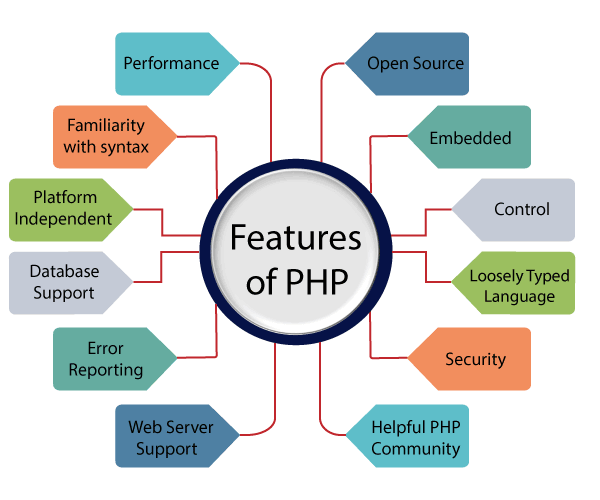PHP Features

PHP (Hypertext Preprocessor) is a versatile server-side scripting language that offers a wide range of features for web development. Here are some key features of PHP:
Dynamic Content Generation: PHP allows for the generation of dynamic web content. It can generate HTML, CSS, JavaScript, and other types of content dynamically based on user input, database queries, or other factors.
Embedding within HTML: PHP code can be embedded directly within HTML markup, allowing for the creation of dynamic web pages. PHP code is enclosed within <?php and ?> tags, making it easy to mix PHP and HTML.
Database Connectivity: PHP provides built-in support for connecting to and interacting with databases. It supports various database management systems, including MySQL, PostgreSQL, SQLite, and others. PHP can execute database queries, fetch results, and manipulate data seamlessly.
Form Handling: PHP simplifies the process of handling HTML forms submitted by users. It can retrieve form data, validate input, and process form submissions, allowing for interactive and user-friendly web applications.
Session Management: PHP supports session management, allowing developers to maintain user-specific data across multiple requests and pages. Sessions enable features such as user authentication, shopping carts, and personalized content delivery.
File Handling: PHP provides functions for handling files and directories on the server. It can read from and write to files, manipulate file attributes, and perform file system operations such as copying, moving, and deleting files.
Security Features: PHP includes features and functions for enhancing the security of web applications. It supports secure password hashing, data encryption, input validation, and protection against common web security threats such as SQL injection and cross-site scripting (XSS).
Object-Oriented Programming (OOP): PHP supports object-oriented programming (OOP) principles such as encapsulation, inheritance, and polymorphism. It allows developers to create reusable and modular code using classes, objects, and methods.
Error Handling: PHP provides mechanisms for error handling and debugging. It supports error reporting, logging, and exception handling to help developers identify and address errors and exceptions in their code.
Extensive Library Support: PHP has a vast ecosystem of libraries, frameworks, and extensions that extend its functionality and streamline development. Popular PHP frameworks include Laravel, Symfony, CodeIgniter, and Zend Framework, which provide pre-built modules, libraries, and tools for building web applications.
Cross-Platform Compatibility: PHP runs on various platforms, including Windows, macOS, Linux, and UNIX. It is compatible with most web servers, including Apache, Nginx, and Microsoft IIS, making it a versatile choice for web development.
Community and Documentation: PHP has a large and active community of developers who contribute to its development, share knowledge, and provide support. The PHP documentation provides comprehensive resources, tutorials, and examples for learning and using PHP effectively.
These features make PHP a popular and widely used language for web development, powering millions of websites and web applications on the internet.
Thank you,